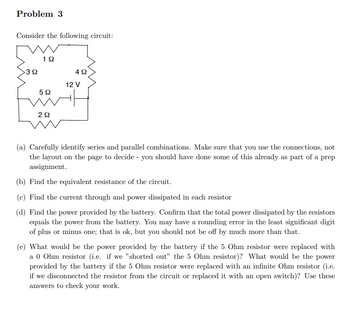
Introductory Circuit Analysis (13th Edition)
13th Edition
ISBN: 9780133923605
Author: Robert L. Boylestad
Publisher: PEARSON
expand_more
expand_more
format_list_bulleted
Concept explainers
Question

Transcribed Image Text:Problem 3
Consider the following circuit:
392
192
5Ω
292
492
12 V
(a) Carefully identify series and parallel combinations. Make sure that you use the connections, not
the layout on the page to decide - you should have done some of this already as part of a prep
assignment.
(b) Find the equivalent resistance of the circuit.
(c) Find the current through and power dissipated in each resistor
(d) Find the power provided by the battery. Confirm that the total power dissipated by the resistors
equals the power from the battery. You may have a rounding error in the least significant digit
of plus or minus one; that is ok, but you should not be off by much more than that.
(e) What would be the power provided by the battery if the 5 Ohm resistor were replaced with
a 0 Ohm resistor (i.e. if we "shorted out" the 5 Ohm resistor)? What would be the power
provided by the battery if the 5 Ohm resistor were replaced with an infinite Ohm resistor (i.e.
if we disconnected the resistor from the circuit or replaced it with an open switch)? Use these
answers to check your work.
Expert Solution
This question has been solved!
Explore an expertly crafted, step-by-step solution for a thorough understanding of key concepts.
This is a popular solution
Trending nowThis is a popular solution!
Step by stepSolved in 4 steps with 3 images

Follow-up Questions
Read through expert solutions to related follow-up questions below.
Follow-up Question
can someone answer d and e?
Solution
by Bartleby Expert
Follow-up Question
can someone do d and e
Solution
by Bartleby Expert
Follow-up Questions
Read through expert solutions to related follow-up questions below.
Follow-up Question
can someone answer d and e?
Solution
by Bartleby Expert
Follow-up Question
can someone do d and e
Solution
by Bartleby Expert
Knowledge Booster
Learn more about
Need a deep-dive on the concept behind this application? Look no further. Learn more about this topic, electrical-engineering and related others by exploring similar questions and additional content below.Similar questions
- Parallel Circuits Review In a Parallel circuit, the Voltage across each cell is the same, while the total current is equal to sum of the currents in each resistor. In a series circuits, the total voltage is equal the sum of the voltages across each resistor. The current, however is the same for each resistor, 1. The circuit shown in the diagram consists of two resistors connected in parallel to a cell. The value of Itotal is equal to 30 A. What is the value of V(2)? 50 -ww www 2. The circuit shown in the diagram consists of two resistors connected in parallel to a cell. The value of the current given by the second ammeter, / is 3 A. What is the value of I (total)? 3. A student sets up the circuit shown in the diagram. The value of Itotal is 8 A and the value of I is 6 A. w www a). What is the value of /(2)? b). What is the potential difference supplied by the cell the circuit?arrow_forwardwhy are you using the high voltage to find the open circuit angle in step 1? isnt the low voltage supposed to be applied in the open-circuit test?arrow_forwardWhat is the voltage in Volts across the resistors where I=17, R1=1,990, and R2=4,977?arrow_forward
arrow_back_ios
arrow_forward_ios
Recommended textbooks for you
 Introductory Circuit Analysis (13th Edition)Electrical EngineeringISBN:9780133923605Author:Robert L. BoylestadPublisher:PEARSON
Introductory Circuit Analysis (13th Edition)Electrical EngineeringISBN:9780133923605Author:Robert L. BoylestadPublisher:PEARSON Delmar's Standard Textbook Of ElectricityElectrical EngineeringISBN:9781337900348Author:Stephen L. HermanPublisher:Cengage Learning
Delmar's Standard Textbook Of ElectricityElectrical EngineeringISBN:9781337900348Author:Stephen L. HermanPublisher:Cengage Learning Programmable Logic ControllersElectrical EngineeringISBN:9780073373843Author:Frank D. PetruzellaPublisher:McGraw-Hill Education
Programmable Logic ControllersElectrical EngineeringISBN:9780073373843Author:Frank D. PetruzellaPublisher:McGraw-Hill Education Fundamentals of Electric CircuitsElectrical EngineeringISBN:9780078028229Author:Charles K Alexander, Matthew SadikuPublisher:McGraw-Hill Education
Fundamentals of Electric CircuitsElectrical EngineeringISBN:9780078028229Author:Charles K Alexander, Matthew SadikuPublisher:McGraw-Hill Education Electric Circuits. (11th Edition)Electrical EngineeringISBN:9780134746968Author:James W. Nilsson, Susan RiedelPublisher:PEARSON
Electric Circuits. (11th Edition)Electrical EngineeringISBN:9780134746968Author:James W. Nilsson, Susan RiedelPublisher:PEARSON Engineering ElectromagneticsElectrical EngineeringISBN:9780078028151Author:Hayt, William H. (william Hart), Jr, BUCK, John A.Publisher:Mcgraw-hill Education,
Engineering ElectromagneticsElectrical EngineeringISBN:9780078028151Author:Hayt, William H. (william Hart), Jr, BUCK, John A.Publisher:Mcgraw-hill Education,

Introductory Circuit Analysis (13th Edition)
Electrical Engineering
ISBN:9780133923605
Author:Robert L. Boylestad
Publisher:PEARSON

Delmar's Standard Textbook Of Electricity
Electrical Engineering
ISBN:9781337900348
Author:Stephen L. Herman
Publisher:Cengage Learning

Programmable Logic Controllers
Electrical Engineering
ISBN:9780073373843
Author:Frank D. Petruzella
Publisher:McGraw-Hill Education

Fundamentals of Electric Circuits
Electrical Engineering
ISBN:9780078028229
Author:Charles K Alexander, Matthew Sadiku
Publisher:McGraw-Hill Education

Electric Circuits. (11th Edition)
Electrical Engineering
ISBN:9780134746968
Author:James W. Nilsson, Susan Riedel
Publisher:PEARSON

Engineering Electromagnetics
Electrical Engineering
ISBN:9780078028151
Author:Hayt, William H. (william Hart), Jr, BUCK, John A.
Publisher:Mcgraw-hill Education,